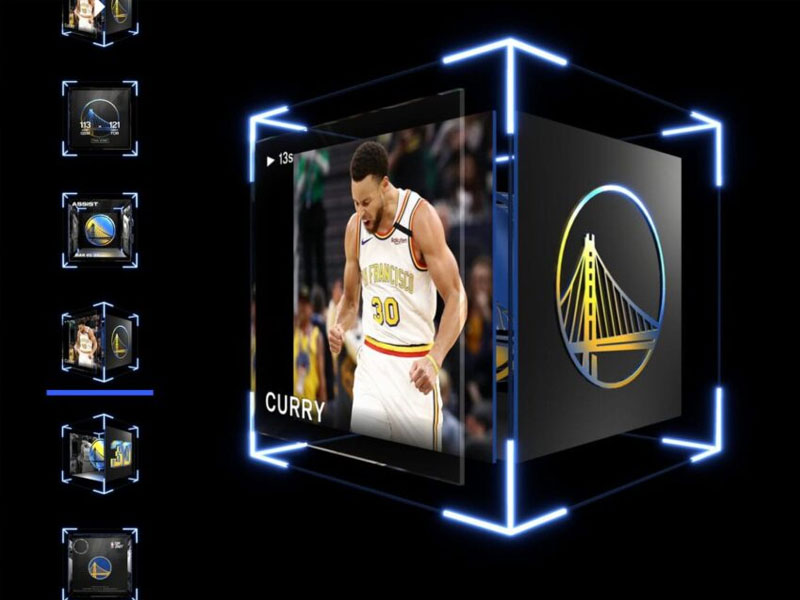The Role of Blockchain Technology in Asia Pacific’s Decentralized Finance Ecosystem
SOURCE: HTTPS://CITYLIFE.CAPETOWN/
NOV 06, 2023
LionGaming CEO: “Our blockchain technology can be toggled on/off for each bettor”
SOURCE: USBETTINGREPORT.COM
SEP 05, 2021

Blockchain technology has become a buzzword that is thrown around frequently, not only in the context of cryptocurrency but in conversations about digital transactions in general. Most recently, DraftKings announced its NFT marketplace which breathed new life into the discussion regarding what role blockchain will play in fantasy sports and sports betting in the future.
One company that has incorporated blockchain technlogy in its sports betting and casino solutions is Lion Gaming, a company based in Canada that caters for U.S. sportsbook and casino operators. We asked CEO Duncan McIntyre a few questions about their technology to learn about how Lion Gaming helps solve the most pressing issues the industry faces, and how they use blockchain to improve the betting experience and security for bettors here in the U.S. and overseas.
What is Lion Gaming and do you have partnerships with sports betting companies here in the U.S.?

McIntyre. Lion Gaming Group develops iGaming technology designed to transform online sportsbooks and casinos. We are the only provider that offers blockchain-based solutions which can be toggled on or off depending on player preference.
Our mobile-first solutions are built to cater to a global betting audience in the U.S. and beyond. Operators equipped with our technology can accept wagers in traditional fiat currency and virtually any cryptocurrency or digital asset. As more and more states begin to regulate online iGaming, we’re actively exploring strategic partnerships to establish ourselves in the U.S. market.
What are the biggest challenges that operators face when building reliable live-betting products?
McIntyre. There are several challenges that operators face when building reliable live-betting products. To start, one thing that operators need to understand is that it’s impossible to be great at everything. There’s only so much you can excel at. Whether it’s customer acquisition and retention, operations, or tech development, operators need to be mindful of where their human and financial resources are going.
That being said, developing betting technology (let alone live-betting technology) requires effort, time, and compliance expertise. So I’d say that a major challenge operators face is the labor, capital, and time required to develop an exceptional product. And as I mentioned, another challenge is that when your resources are tied up in tech development and maintenance, there is less that can be put toward what operators really need to succeed – mainly customer acquisition and retention. We often see operators outsource their technology to providers who offer reliable live-betting products and exceptional UX/UI designs; this way operators can fully dedicate their efforts to marketing and servicing their customers.
In your opinion, what makes a good live-betting product? Data? UX? Something else?
McIntyre. The short answer is both. Live-betting products need to be integrated with reliable odds-feed and data providers that in turn create great user experiences. It’s very frustrating for a bettor to see action they like only to be declined by the operator when they try to place the bet. UX design is obviously key, along with speed and the ability for players to get their money down.
In addition, integrating live streaming feeds for sports or esports can help facilitate live bets and keep bettors engaged on an operator’s platform.
How do you convert new bettors using live-betting technology and offers? What are the aspects of the betting experience that make novice bettors tick?
McIntyre. I think most new bettors actually aren’t attracted by the possibility of live betting as much as they are attracted by welcome offers, bonuses, and betting on their favorite sports in general. They are typically exposed to live betting once they’ve matured a bit as bettors, so I wouldn’t say that live betting is much of a factor for user acquisition, although it does have a role in user engagement and retention.
In terms of what makes novice bettors tick, I think it’s the excitement that comes along with having “skin in the game” on an event. What we’re really excited about here at Lion Gaming is that our product incorporates a social/community aspect to it. Bettors can see where they rank among others in terms of their betting prowess.
For example, a bettor can see where they rank across all bettors who placed wagers on Monday Night Football, or they can see where they rank across all Los Angeles Lakers bettors for the night, month, or all season. They can get as granular or as wide as they want with the community analytics. We believe this is something that both novice and established bettors, as well as operators, are going to be really excited about.
Equally, what do pro bettors think of live betting and how should operators cater to bettors who are used to a different type of betting experience?
McIntyre. It would depend on the strategy and preferences of the bettor you asked. Bettors who wager on multiple sports leagues are likely less inclined to live betting, as it is more difficult to follow, and the odds in live events can change rapidly. Likewise, bettors who follow a single game or league per week may prefer live betting as they have more information to work with. For example, if a team is winning by a large margin in the NFL at halftime, a bettor may have more interest in certain types of bets, as historically teams winning by a wide margin try and run out the clock.
Since every bettor has its own strategy, it is imperative for an operator to be able to accommodate the range of needs that exist for differing preferences. Professional bettors have increasingly mature operations utilizing machine learning, advanced analytics, and financial-level investment strategies. The principals remain the same, however. These bettors want to get their money down and with speed.
How is blockchain technology used in your live-betting products?
McIntyre. Blockchain technology has a number of benefits beyond just the ability to accept and place wagers in Bitcoin, Ethereum, Dogecoin, and other cryptocurrencies. It ensures secure and transparent transactions, it adds an extra layer of reassurance for bettors who know that their bets will be paid out with the use of smart contracts, and it can increase profit margins for operators by eliminating some fees and delays. The benefits listed above are applicable to both our regular betting and live betting products.
The Canadian sports betting market is opening up. How does that affect your future plans and product roadmap?
McIntyre. To start, we know that we’re not the only ones looking at the Canadian market. And as a Canadian company, we are very excited about the developments happening on this side of the border. Any time new jurisdictions or regions start opening up for regulated gambling the major players and new operators all want access to that market.
The reality for us is that Canada will be a major market like any other country with tens of millions of people. Lion Gaming only works with regulated operators and is built from a compliance-first perspective. We believe that our offering provides enhanced transparency from a regulatory perspective. Canadian licensing ambitions are certainly on our roadmap.
LATEST NEWS
Artificial Intelligence
Eerily realistic: Microsoft’s new AI model makes images talk, sing
APR 20, 2024
WHAT'S TRENDING


Data Science
5 Imaginative Data Science Projects That Can Make Your Portfolio Stand Out
OCT 05, 2022

SOURCE: HTTPS://CITYLIFE.CAPETOWN/
NOV 06, 2023
SOURCE: HTTPS://WWW.FORBES.COM/
SEP 22, 2023
SOURCE: HTTPS://WWW.THECOINREPUBLIC.COM/
SEP 03, 2023
SOURCE: HTTPS://WWW.SCIENCEDAILY.COM/
AUG 17, 2023
SOURCE: WWW.INVESTOPEDIA.COM
JUL 20, 2023
SOURCE: HTTPS://COINTELEGRAPH.COM/
JUL 19, 2023
SOURCE: HTTPS://PLANET.OUTLOOKINDIA.COM/OPINIONS/THE-ROLE-OF-BLOCKCHAIN-IN-CREATING-A-SUSTAINABLE-FUTURE-NEWS-415572
JUN 30, 2023